
Harlan Jay Ellison was an American writer, known for his prolific and influential work in New Wave speculative fiction and for his outspoken, combative personality. His published works include more than 1,700 short stories, novellas, screenplays, comic book scripts, teleplays, essays, and a wide range of criticism covering literature, film, television, and print media. Some of his best-known works include the 1967 Star Trek episode "The City on the Edge of Forever", considered by some to be the single greatest episode of the Star Trek franchise, his A Boy and His Dog cycle, and his short stories "I Have No Mouth, and I Must Scream" and "'Repent, Harlequin!' Said the Ticktockman". He was also editor and anthologist for Dangerous Visions (1967) and Again, Dangerous Visions (1972). Ellison won numerous awards, including multiple Hugos, Nebulas, and Edgars.
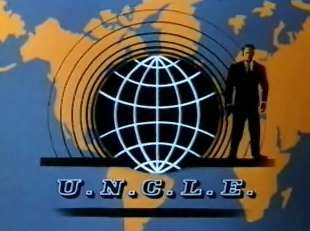
The Man from U.N.C.L.E. is an American spy fiction television series produced by Metro-Goldwyn-Mayer Television and first broadcast on NBC. The series follows secret agents Napoleon Solo, played by Robert Vaughn, and Illya Kuryakin, played by David McCallum, who work for a secret international counterespionage and law-enforcement agency called U.N.C.L.E.. The series premiered on September 22, 1964, and completed its run on January 15, 1968. The program was part of the spy-fiction craze on television, and by 1966 there were nearly a dozen imitators. Several episodes were successfully released to theaters as B movies or double features. There was also a spin-off series, The Girl from U.N.C.L.E., a series of novels and comic books, and merchandising.

The spy film, also known as the spy thriller, is a genre of film that deals with the subject of fictional espionage, either in a realistic way or as a basis for fantasy. Many novels in the spy fiction genre have been adapted as films, including works by John Buchan, le Carré, Ian Fleming (Bond) and Len Deighton. It is a significant aspect of British cinema, with leading British directors such as Alfred Hitchcock and Carol Reed making notable contributions and many films set in the British Secret Service.

James Harrison Coburn III was an American film and television actor who was featured in more than 70 films, largely action roles, and made 100 television appearances during a 45-year career.
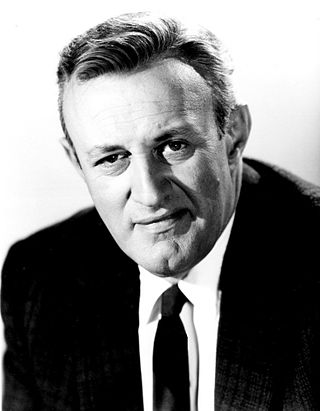
Lee J. Cobb was an American actor, known both for film roles and his work on the Broadway stage, as well as for his television role in the series, The Virginian. He often played arrogant, intimidating and abrasive characters, but he also acted as respectable figures such as judges and police officers. Cobb originated the role of Willy Loman in Arthur Miller's 1949 play Death of a Salesman under the direction of Elia Kazan, and was twice nominated for the Academy Award for Best Supporting Actor, for On the Waterfront (1954) and The Brothers Karamazov (1958).
"'Repent, Harlequin!' Said the Ticktockman" is a dystopian science fiction short story by American writer Harlan Ellison that was published in 1965. It is nonlinear in that the narrative begins in the middle, then moves to the beginning, then the end, without the use of flashbacks. Stylistically, the story deliberately ignores many of the conventional "rules of good writing", including a paragraph about jelly beans which is almost entirely one run-on sentence. First appearing in the science fiction magazine Galaxy in December 1965, it won the 1966 Hugo Award, the 1965 Nebula Award and the 2015 Prometheus Hall of Fame Award.

Casino Royale is a 1967 spy parody film originally distributed by Columbia Pictures featuring an ensemble cast. It is loosely based on the 1953 novel of the same name by Ian Fleming, the first novel to feature the character James Bond.
Spy-fi is a subgenre of spy fiction that includes elements of science fiction, and is often associated with the Cold War. Features of spy-fi include the effects of technology on the espionage trade and the technological gadgets used by the characters, even though the technologies and gadgets portrayed are well beyond contemporary scientific reality.
Derek Flint is a fictional world adventurer and master spy featured in a series of movies and comic books. Flint, a parody of James Bond and Doc Savage, is an agent for Z.O.W.I.E..

In Like Flint is a 1967 American spy fi comedy film directed by Gordon Douglas, the sequel to the parody spy film Our Man Flint (1966).
"Our Man Bashir" is the 82nd episode of the American science fiction television series Star Trek: Deep Space Nine, the tenth of the fourth season. It originally aired on November 27, 1995, in broadcast syndication. Directed by Winrich Kolbe, the story originated from a pitch by Assistant Script Coordinator Robert Gillan and was turned into a script by producer Ronald D. Moore. Both hairdressing in the episode and the score by Jay Chattaway were later nominated for Emmy Awards. The episode's plot involves the combination of two much-used Star Trek plot devices: a transporter accident and a holodeck malfunction.
Benedict Richard Pierce Macintyre is a British author, reviewer and columnist for The Times newspaper. His columns range from current affairs to historical controversies.
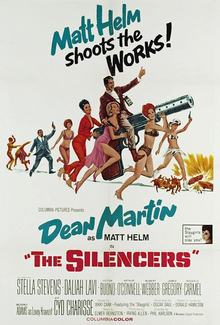
The Silencers is a 1966 American spy comedy film directed by Phil Karlson, starring Dean Martin as agent Matt Helm. The screenplay by Oscar Saul is based on the 1962 novel of the same name by Donald Hamilton, while also adapting elements of Hamilton's first Helm novel, Death of a Citizen (1960). The film co-stars Stella Stevens, Daliah Lavi, Victor Buono, Arthur O'Connell, Robert Webber, James Gregory, Roger C. Carmel, Beverly Adams, and Cyd Charisse.
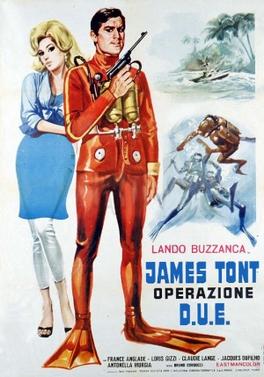
Eurospy film, or Spaghetti spy film, is a genre of spy films produced in Europe, especially in Italy, France, and Spain, that either sincerely imitated or else parodied the British James Bond spy series feature films. The first wave of Eurospy films was released in 1964, two years after the first James Bond film, Dr. No, and in the same year as the premiere of what many consider to be the apotheosis of the Bond series, Goldfinger. For the most part, the Eurospy craze lasted until around 1967 or 1968. In Italy, where most of these films were produced, this trend replaced the declining sword and sandal genre.
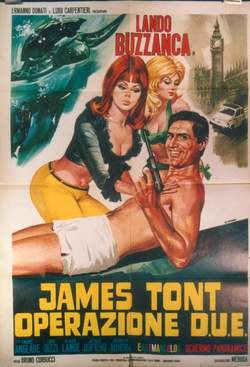
James Tont operazione D.U.E. or The Wacky World of James Tont is a 1966 French/Italian international co-production spy film spoof based on James Bond's Thunderball and featuring elements predating the release of You Only Live Twice. Directed by Bruno Corbucci, the Eurospy spy-fi comedy adventure is the sequel to James Tont operazione U.N.O. (1965) with Lando Buzzanca repeating his role as 00 Agent James Tont, a satire of James Bond and Loris Gizzi as the black monocle wearing supervillain spoof of Emilio Largo.
The following outline is provided as an overview of and topical guide to James Bond:
Dead on Target is an American television film. The film originally aired on ABC on March 17, 1976, and was shot in Vancouver, British Columbia. The film was a backdoor pilot for a possible weekly series, but it was not picked up to series, and it became the last Derek Flint movie. Ray Danton replaces James Coburn as Derek Flint, who is now a private detective and former Z.O.W.I.E. government agent. The cast also includes Sharon Acker, Susan Sullivan, Lawrence Dane, Gay Rowan, Linda Woods, Donnelly Rhodes, and Kim Cattrall.

Fred Aldrich was an American character actor of both film and television. Born in New York. He would break into the film industry in 1939, appearing in two films that year in small roles: My Son Is Guilty, and the notable, Confessions of a Nazi Spy, which starred Edward G. Robinson and George Sanders. In the course of his thirty-year career he would appear in over 170 films, in small and bit roles. With the advent of television, Aldrich would work in that medium as well, making his first small screen appearance on I Love Lucy, on which he would appear multiple times over the life of the series.











